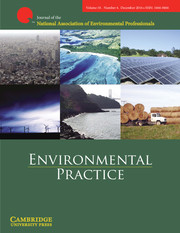No CrossRef data available.
Article contents
PERSPECTIVE: The Emperor's New Clothes and the USEPA's Decision to Dredge Hudson River PCBs
Published online by Cambridge University Press: 17 October 2005
Extract
For decades, the United States Environmental Protection Agency (USEPA) has considered dredging the Hudson River to remove polychlorinated biphenyls (PCBs). The cost would be hundreds of millions of dollars initially, and over a billion dollars cumulatively, for limited PCB “hotspot” dredging. The USEPA now has postponed dredging to 2007, allowing time to consider whether dredging constitutes the best use of funds. For example, would greater health benefits be obtained more inexpensively by presenting each household along the Hudson with a treadmill? Would greater per capita benefits be obtained by establishing a research institute addressing local epidemiological issues?
- Type
- POINTS OF VIEW
- Information
- Copyright
- © 2005 National Association of Environmental Professionals


